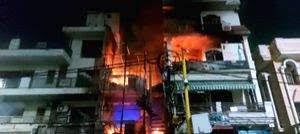Dr Atul Goel, DGHS, Union Health Ministry conducted a virtual meeting with States/UTs to assess the preparedness of Heat wave conditions and fire & electrical safety measures adopted by various health care facilities across the country.
As per the long-range outlook forecast issued by IMD on 27th May 2024, it is forecasted that in June 2024, above-normal monthly maximum temperatures are likely over most part of the country, except in parts of the southern peninsular India, where normal to below normal temperatures are most likely. During June, above normal heat wave days are likely over most areas of Northwest India and adjoining parts of Central India.
State Health departments have been sent the following directives:
- Advisory for State Health Departments, guidelines on Strengthening Health Systems Preparedness for Heat-Related Illnesses (HRI)
- A Public Health Advisory with Do’s and Don’ts and IEC poster templates.
- Guidelines on Emergency Cooling for Severe Heat-Related Illnesses.
- Guidelines on Autopsy Findings in Heat Related Deaths were disseminated to all AIIMS & Medical Colleges across the country
- Joint communication from Secretary (Health), MoHFW and NDMA and a communication from Directorate General of Health Services on health facility fire safety measures.
- Checklist for assessment of Health Facility and Ambulance Preparedness to prevent and manage health impacts of heat.
Through a letter sent on 23rd March 2024, States/UTs have been requested to take proactive measures to prevent devastating incidents caused by extreme heat. This was followed by another letter on 29 May 2024 for taking all preventive measures in respect to fire safety.
Following detailed steps and measures to be undertaken by State/UTs were reiterated in the meeting:
- Implementation of Heat Health Action Plan
- Dissemination of early warning of heat waves issued by India Meteorological Department (IMD)
- Preparedness Assessment of all Health Care Facilities & Ambulance preparedness for prevention and management of HRI
- Strengthening Heat-Related Illness and Death surveillance on IHIP
- Dedicated Heat Stroke room at all Health Care facilities
- Issue health advisories and plan IEC activities
- Sensitization and capacity building of medical officers and health care staff of health facilities on HRI symptoms, case identification, clinical management, emergency cooling and surveillance reporting.
- Health facility resiliency to extreme heat
- HRI-Focused Mass Gathering/Sporting Event Preparedness
- Conducting regular preventive fire risk assessment drills to identify potentially vulnerable areas
- Implementing appropriate fire prevention measures, such as proper storage of flammable materials and regular and optimal preventive maintenance of electrical circuits and systems.
- Providing staff training on fire safety protocols, evacuation procedures, and use of fire-fighting equipment.
- Installation and optimum maintenance of fire detection and suppression systems, including smoke alarms, fire extinguishers, and sprinklers.
- Establishing an emergency response plan with SOPs for evacuating patients, staff, and visitors in the untoward event of a fire.
- Most importantly, regular conduction of mock emergency drills without compromise.
State level preparedness:
It was informed that the highest-level officials of all State/UTs are monitoring the situation stringently. States like Madhya Pradesh have undertaken mock-drill exercises on fire-safety accidents in all Government & Private Hospitals. Urban Administration & Engineering departments were coordinated for conducting mock drills regarding fire safety. Code Red Protocol has also been issued. Heat Wave Control rooms have been established across the State in Odisha. DASTAK (Door-to-door) campaign are being conducted for raising awareness of the population in Uttar Pradesh. Fire Safety Officers identified in almost all health facilities in this state. Haryana have made dedicated financial allocation to ensure essential drugs and logistics at all Health Care facilities. In Rajasthan, ambulances linked to 104 & 108 are equipped with cooling appliances. In West Bengal, Fire Safety certificates are ensured from fire departments and mock drills are being conducted. In Bihar, co-ordination is ongoing with State Disaster Management Authority for Preventing fire incidents at Health care facilities. Delhi has also issued directives and SOP for firefighting system to all government and private hospitals. If fire NOC is not available even in smaller facilities, either in government / in private institutes, fire evacuation plans and firefighting system has been made mandatory to be kept in place.











